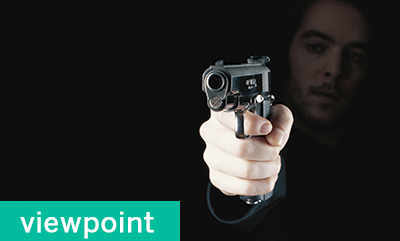“A Safer Place to Call Home”—Gun Control in Situations of Domestic Violence.
 Viewpoint articles are written by members of the SPH community from a wide diversity of perspectives. The views expressed are solely those of the author and are not intended to represent the views of Boston University or the School of Public Health. We aspire to a culture where all can express views in a context of civility and respect. Our guidance on the values that guide our commitment can be found at Revisiting the Principles of Free and Inclusive Academic Speech.
Viewpoint articles are written by members of the SPH community from a wide diversity of perspectives. The views expressed are solely those of the author and are not intended to represent the views of Boston University or the School of Public Health. We aspire to a culture where all can express views in a context of civility and respect. Our guidance on the values that guide our commitment can be found at Revisiting the Principles of Free and Inclusive Academic Speech.
With new studies indicating that more guns equal more crime, it is time, now more than ever, that we as a society commit to developing rigorous gun control reform. Every day on the news, we are bombarded with stories of racially charged shootings, mall massacres, and children bringing guns to school. It is imperative to acknowledge that this issue does not only affect us in the public sphere, but also in our homes. As Gloria Steinem recently stated in an interview, “The most dangerous place for a woman, statistically speaking, is not in the street. It’s in her own home.” And statistics do support this notion, especially when guns are involved. Studies indicate that “domestic violence assaults involving a gun are 12 times more likely to result in a death than those involving other weapons or bodily force” and that “abused women are five times more likely to be killed by their abuser if the abuser owns a firearm.” This evidence foreshadows the deadly consequences that may transpire when domestic violence perpetrators are entrusted with the means to inflict lethal harm.
The Violence Against Women Act (VAWA) prohibits those who have been convicted of domestic violence crimes from possessing firearms; however, this legislation has major loopholes. For example, the federal law only covers married couples, or those who have cohabitated or have a child together. This systematic gap leaves all other relationships vulnerable to the abuse of firearms; moreover, the law does not sanction the removal of weapons already in the possession of abusers.
In order to decrease violent gun crime between intimate partners, many states have attempted to expand on this legislation. In March of this year, former Arizona Congresswoman Gabby Giffords visited the New Jersey statehouse to lobby for stricter gun control laws in cases of domestic violence in the Garden State. She championed a proposed bill that would ensure that known domestic violence perpetrators would be required to surrender their weapons once served with a restraining order or convicted of an abuse crime. The state of New Jersey is currently awaiting a ruling in order to pass this firearms legislation.
As expected, opponents were up in arms (pun intended) about this proposed restriction on weapons. But what these challengers must recognize is that Giffords, and most of those lobbying for gun control, do not want to abolish the Second Amendment. On the contrary, their legislation would purely ensure that guns do not remain in the hands of those who are known criminal offenders, and thus aggravate the legitimacy of this right. If you consider yourself an unyielding Second Amendment supporter, consider this: Do you also support the fundamental right to life as guaranteed in the Fourteenth Amendment? Don’t we all deserve that protection?
While driving through the South End of Boston last week, I noticed a “Stop Handgun Violence” billboard that proclaimed, “We’re not anti-gun. We’re pro-life.” I was struck by this brilliant handiwork—which I am assuming was intentional wordplay— and inspired by the unconventional reference to the Fourteenth Amendment in order to form a new perspective on gun control reform. These new, proposed gun control legislations are not trying to infringe on individual freedoms but are instead attempting to provide citizens with one of the most basic, fundamental rights that could possibly exist: the right to a safe, healthy life.
The counter-argument remains that if we enact stricter gun legislation, there is a possibility of eliminating a means of self-protection from victims of domestic violence. In instances of intimate partner violence, it is often the case that a victim will use weapons to “level the playing field,” as a weapon can help to counter the sheer, brute force or size with which an abuser may overpower the victim. Perhaps, one may argue, guns are the great equalizer?
Not likely. Data indicates that “for every time a woman used a handgun to kill an intimate acquaintance in self-defense, 83 women were murdered by an intimate acquaintance with a handgun.” Additionally, studies have shown that when there is a weapon in the home, women have only been able to successfully utilize it for self-defense purposes 7 percent of the time, and that in most of these instances the weapon was merely used as a threat. Furthermore, in two-thirds of these homes with guns, the abusers used the guns against their partners. For some, the idea of using a firearm for protection may provide a sense of safety, but in reality guns are providing a mere illusion of security.
A recent article in the New York Times cited a shocking pattern that weighs too heavily to be ignored. The article revealed that the Boston Marathon bombings perpetrator Tamerlan Tsarnaev, Australian cafe hostage taker Haron Monis, and the man who shot Trayvon Martin, George Zimmerman, had all been charged with crimes of domestic violence prior to their charges of murder. The article cites further evidence that “a felony domestic violence conviction is the single greatest predictor of future violent crime among men.” When domestic violence seems to be such a strong indicator for other forms of violence, how can we neglect a preventative solution that would save countless lives, all in the name of politics?
In 2011, nearly two-thirds of women who were killed with guns were murdered by their intimate partners. When a death toll of that amplitude is attributed to domestic violence, the question that should weigh heavily on the conscience of our country is this: How many of these deaths could have been prevented?
We can do better than this. We can begin to expand the discourse, elevating the debate on gun control reform to a multi-faceted status of political and public health importance. If we as a society can begin to view this issue through a clearer lens, perhaps “home” can become a safer place, and more individuals can secure their right to a violence-free life.
 Lindsay Morrissey is an MPH candidate in the Department of Social and Behavioral Health Sciences. She can be reached at lmor@bu.edu. Follow her on Twitter at @lindsaymo89.
Lindsay Morrissey is an MPH candidate in the Department of Social and Behavioral Health Sciences. She can be reached at lmor@bu.edu. Follow her on Twitter at @lindsaymo89.